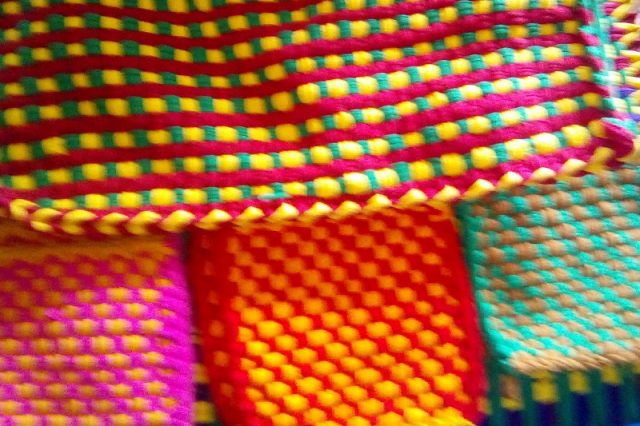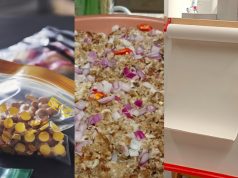Woven textile products by a US-based brand resemble the design of doormats being sold in the Philippines.
These are the reactions of some social media users to a recent post by Vogue Runway, an international fashion magazine.
Woven textile made of T-shirts
On an Instagram post on February 8, Vogue Runway featured an artist named Elise McMahon, founder of an artist studio called Like Minded Objects.
The photo showcased her works—colorful woven textiles from old t-shirts.
View this post on Instagram
According to the post, Elise and the art studio she founded specialized in upcycling discarded fabrics.
“The United States has a t-shirt problem, with millions of tees discarded every month. Enter Elise McMahon, founder of the studio @LikeMindedObjects, who specializes in creating upcycled items from discarded fabrics,” the caption reads.
“Using an 18″x18″ loom, she makes a woven textile from old tees, creating a heavy, puffy material not dissimilar from quilted fabrics or weighted blankets—and she wants you to be able to do the same,” it added.
In the interview, Elise, a furniture designer based in Hudson, New York, shared that the overabundance of t-shirts and other clothing in the US motivated her to help repurpose them into woven textile pieces.
Elise said that she called up her friend, textile artist Francesca Campone, to create these products.
“We went right to making upholstery patterns. It could also become a jacket or a sweater, or weighted blankets, or rugs,” Elise was quoted as saying.
Based on LikeMindedObjects.com, the product called “T-shirt waste loom” costs $200 each on a pre-order basis.
Each item comprises a manual, a QR video for a video class and a loom. A loom is a wooden frame to create the woven textile.
‘Basahan, doormat, rugs’
The comments section on Vogue Runway’s Instagram post was mostly filled with remarks from Filipinos who pointed out that the patterns resemble those of commonly used doormats in the Philippines.
“In the PHILIPPINES we call it DOORMATS,” one user said.
“Not an original concept. These are Philippine doormats/potholder,” another user wrote.
The post also reached Twitter and online forum r/Philippines.
Award-winning writer Jerry Gracio later joined other users in poking fun at the pricier version of the handwoven cloth.
‘Yung basahan natin na 3-for-100 puwede nang i-frame! Jusko, bumili na kayo, bago magkaubusan at dalhin sa New York ang mga doormat natin! ☺️ pic.twitter.com/gY2lFyD3ZH
— Jerry B. Grácio (@JerryGracio) February 8, 2022
“’Yung basahan natin na 3-for-100 puwede nang i-frame! Jusko, bumili na kayo, bago magkaubusan at dalhin sa New York ang mga doormat natin!” Gracio said.
“It’s not trapo anymore, its trapeaughx,” another Twitter user quipped.
There were also online users who said that the design is similar to doormats from India, Indonesia and other countries.
“In India too we get doormats like this, sometimes we just make it by ourselves,” a Twitter user said.
“In Indonesia, we call it keset the price is around $1 or less,” another Twitter user said.
“These are common doormats in South Asia and Latin America lmao,” another Instagram user commented.
Some online users, on the other hand, questioned Vogue Runway for showcasing pieces that have long been crafted in other countries.
“We’ve been doing it for decades but when a white person does it, it gets a Vogue spotlight and a 200 dollar price tag?” one user Twitter lamented.
“Ummmmm…the Philippines has been doing this for YEAAAARRRRSSSSS…where’s our feature?” another Instagram user asked.
In the Philippines, a brand called Rags2Riches, a fashion and design house empowering community artisans in the Philippines, has been weaving a variety of pieces from upcycled, overstock fabrics and local textiles for more than a decade now.
In 2017, the founder of the brand partnered with women of Payatas, Quezon City who are selling fabric scraps and weaving them into foot rugs. Payatas is a community with one of the largest dump sites in the Philippines.
They also teamed up with local designers to create high-fashion pieces from the women’s weaves.
“The women no longer had to sell rags in the street. They were now creating wearable art that showcased their talent, craftsmanship, and potential,” the brand’s profile read.
“This not only meant higher wages. It meant a deeper sense of pride, self-worth, and empowerment,” it added.
Meanwhile, as of writing, Vogue Runway’s Instagram post garnered more than 26,500 likes and over 1,100 comments. since it has been posted on Tuesday (Philippine time).





